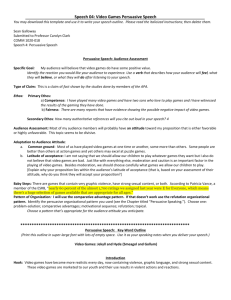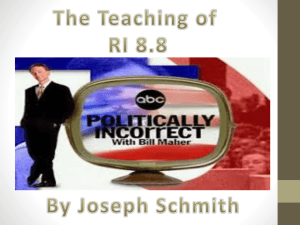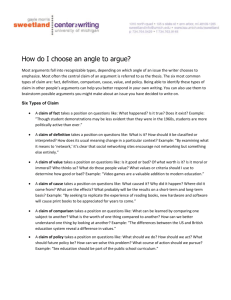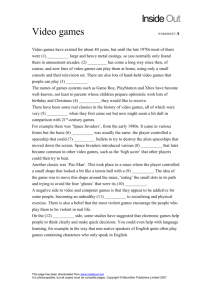synthesis paper
advertisement
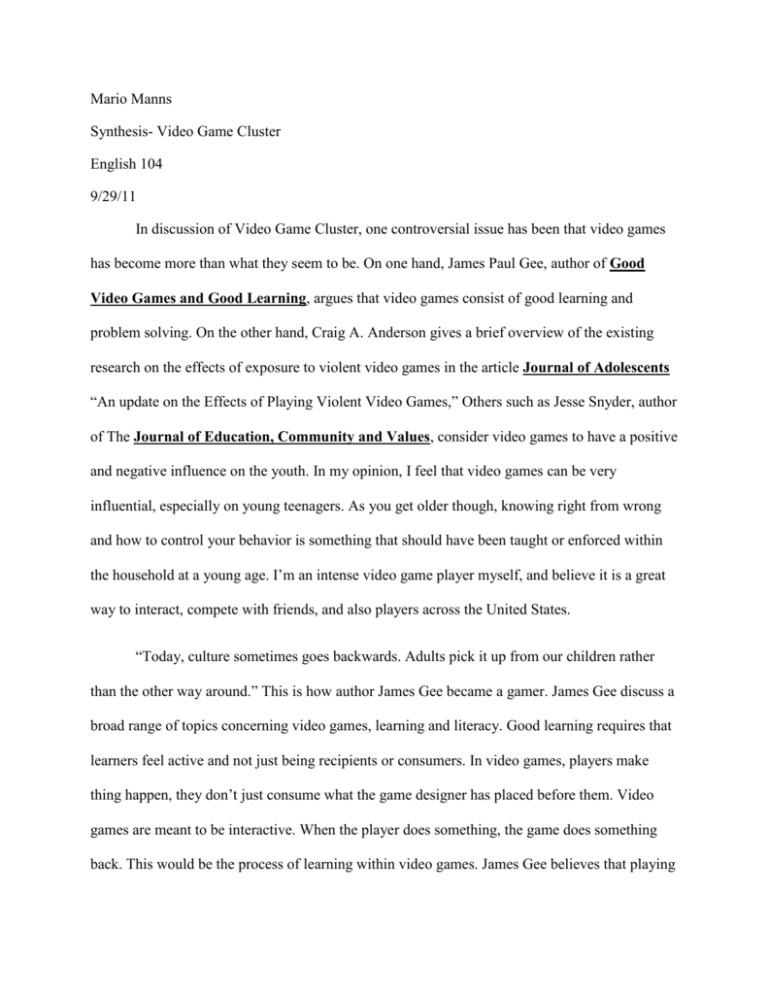
Mario Manns Synthesis- Video Game Cluster English 104 9/29/11 In discussion of Video Game Cluster, one controversial issue has been that video games has become more than what they seem to be. On one hand, James Paul Gee, author of Good Video Games and Good Learning, argues that video games consist of good learning and problem solving. On the other hand, Craig A. Anderson gives a brief overview of the existing research on the effects of exposure to violent video games in the article Journal of Adolescents “An update on the Effects of Playing Violent Video Games,” Others such as Jesse Snyder, author of The Journal of Education, Community and Values, consider video games to have a positive and negative influence on the youth. In my opinion, I feel that video games can be very influential, especially on young teenagers. As you get older though, knowing right from wrong and how to control your behavior is something that should have been taught or enforced within the household at a young age. I’m an intense video game player myself, and believe it is a great way to interact, compete with friends, and also players across the United States. “Today, culture sometimes goes backwards. Adults pick it up from our children rather than the other way around.” This is how author James Gee became a gamer. James Gee discuss a broad range of topics concerning video games, learning and literacy. Good learning requires that learners feel active and not just being recipients or consumers. In video games, players make thing happen, they don’t just consume what the game designer has placed before them. Video games are meant to be interactive. When the player does something, the game does something back. This would be the process of learning within video games. James Gee believes that playing video games is a way that we can study and exercise the human mind in ways that may give us deeper insights into human thinking and learning. The most important thing is that we educate ourselves about how to draw the good from this new and powerful technology that has captured our children and young teenagers but most important, ourselves. In the article, “An Update on the Effects of Playing Violent Video Games” Craig A. Anderson gives a brief look at existing research on the effects of exposure to violent video games. An updated meta- analysis states that “exposure to violent video games is way or link to increase aggressive behavior, cognition, affect, and decreases the ability to help your behavior.” The research on violent video games is smaller than the literature on violent television shows, and movies. According to the article, research is shown that violent video games are considerably smaller than the literature on violent television shows and movies. This is due from the lack of government funding for such research. For many in the general public, the problem with video game violence first began with school shootings. More recent violent crimes that have been linked to violent video games include a school shooting spree in Santee, California 2001. Several other states were also linked to video game crimes for example: California, Ohio, Oregon, Minnesota, and Michigan. Not only is this affecting the United States, but video game related violent crimes have also been reported in several countries, including Germany and Japan. Researchers provide evidence that if youths spent little time playing video games, then the overall cost to society would likely be smaller. Jesse Snyder, author of The Journal of Education, Community, and Values, express that “video gaming is a great way interact with other people and have a good time.” However he also feels that some immature gamers push the boundaries of socially acceptable behavior. For example students in English class writing in this form “I h8 work, it sux.” This kind of spelling and slang is used during game play, and is now being transformed and used on a daily basis. Snyder believes this is an example of Counter Strike Culture, which is due from video game playing. When Counter Strike Culture starts interfering with real life activities, problems like these will continue to rise. It is effecting the youth, but yet, Snyder feels there is no need for change, because it won’t be going away anytime soon. Based on the information that I have read, video games can affect all users. Even though video and computer games are looked at as time wasters by our parents, kids are going to continue to play them. In my opinion, video games consist of both good and bad effects. I agree with James Gee, author of Good Video Games and Good Learning, video games is a great way of learning and following instructions. Also, video games can increase hand-eye coordination, and helps develop strategies. From personal experience, I believe playing video games is much safer than having your child or teenager out doing drugs, alcohol, or any sort of similarity in the real world. On the other hand after reading Craig A. Anderson article, I came to a conclusion that the major concern today is children is being effected by mainly violent video games. I disagree with that statement because it is not only violent video games that’s effecting the youth, its video games in general. For example, Madden and 2k are sport related games, but yet still has a strong effect on teenagers who play sports. Playing video games can result in spending less time doing homework, reading, and interacting with your family or friends. In conclusion, after reading and connecting three articles, video games can easily confuse children and teenagers at a young age, by easily mistaking the difference between reality and fantasy. There are several solutions to this problem as far as monitoring what they are playing just like you would when watching television or listening to music, and also limiting their game play and content of each game. Video games come with an age rating, so there should not be any excuses on why your child or teenager is playing rated M (for Mature) games. Works Cited Gee, James Paul. "Good Video Games Good Learning ... - James Paul Gee." Google Books. Web. 07 Oct. 2011. <http://books.google.com/books?id=6NY2i9stxZwC>. Web. 07 Oct. 2011. <https://webcourses.niu.edu/@@/3DEE1859441563F9D1C26B19957C5CFA/courses/1/20118ENGL-104---M05/content/_2471722_1/VideoGame5.pdf>. "Interface: The Journal for Education, Community, and Values." The Berglund Center for Internet Studies: Home. Web. 07 Oct. 2011. <http://bcis.pacificu.edu/journal/2003/08/snyder.php>.
